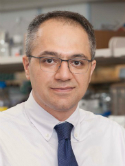APOBEC3 mutagenesis drives therapy resistance in breast cancer Journal Article
| Authors: | Gupta, A.; Gazzo, A.; Selenica, P.; Safonov, A.; Pareja, F.; da Silva, E. M.; Brown, D. N.; Shao, H.; Zhu, Y.; Patel, J.; Blanco-Heredia, J.; Stefanovska, B.; Carpenter, M. A.; Chen, Y.; Vegas, I.; Pei, X.; Frosina, D.; Jungbluth, A. A.; Ladanyi, M.; Curigliano, G.; Weigelt, B.; Riaz, N.; Powell, S. N.; Razavi, P.; Harris, R. S.; Reis-Filho, J. S.; Marra, A.; Chandarlapaty, S. |
| Article Title: | APOBEC3 mutagenesis drives therapy resistance in breast cancer |
| Abstract: | Acquired genetic alterations drive resistance to endocrine and targeted therapies in metastatic breast cancer; however, the underlying processes engendering these alterations are largely uncharacterized. To identify the underlying mutational processes, we utilized a clinically annotated cohort of 3,880 patient samples with tumor-normal sequencing. Mutational signatures associated with apolipoprotein B mRNA-editing enzyme catalytic polypeptide-like 3 (APOBEC3) enzymes were prevalent and enriched in post-treatment hormone receptor-positive cancers. These signatures correlated with shorter progression-free survival on antiestrogen plus CDK4/6 inhibitor therapy in hormone receptor-positive metastatic breast cancer. Whole-genome sequencing of breast cancer models and paired primary-metastatic samples demonstrated that active APOBEC3 mutagenesis promoted therapy resistance through characteristic alterations such as RB1 loss. Evidence of APOBEC3 activity in pretreatment samples illustrated its pervasive role in breast cancer evolution. These studies reveal APOBEC3 mutagenesis to be a frequent mediator of therapy resistance in breast cancer and highlight its potential as a biomarker and target for overcoming resistance. © The Author(s) 2025. |
| Keywords: | controlled study; human tissue; protein expression; treatment outcome; unclassified drug; human cell; major clinical study; single nucleotide polymorphism; somatic mutation; genetics; mutation; follow up; biological marker; chromosome; mouse; phenotype; animal; animals; mice; gene; progression free survival; cohort analysis; daughter cell; drug resistance; pathology; drug resistance, neoplasm; cell line, tumor; breast neoplasms; cytidine deaminase; genomic instability; breast tumor; tumor cell line; therapy resistance; drug therapy; disease control; doxycycline; cyclin dependent kinase inhibitor; tumor gene; loss of function mutation; mutagenesis; antiestrogen; cyclin dependent kinase 4; cyclin dependent kinase 6; clinical outcome; indel mutation; mutagenic activity; exome; growth curve; humans; human; male; female; article; whole genome sequencing; hormone receptor positive breast cancer; whole exome sequencing; apolipoprotein b mrna editing enzyme catalytic polypeptide like; tumor mutational burden; apobec deaminases; apobec3 proteins, human; apolipoprotein b mrna editing enzyme catalytic polypeptide like 3 |
| Journal Title: | Nature Genetics |
| Volume: | 57 |
| Issue: | 6 |
| ISSN: | 1061-4036 |
| Publisher: | Nature Publishing Group |
| Date Published: | 2025-06-01 |
| Start Page: | 1452 |
| End Page: | 1462 |
| Language: | English |
| DOI: | 10.1038/s41588-025-02187-1 |
| PUBMED: | 40379787 |
| PROVIDER: | scopus |
| PMCID: | PMC12165862 |
| DOI/URL: | |
| Notes: | The MSK Cancer Center Support Grant (P30 CA008748) is acknowledged in the PubMed record and PDF. Corresponding MSK author is Sarat Chandarlapaty -- Source: Scopus |
Altmetric
Citation Impact
BMJ Impact Analytics
MSK Authors
Related MSK Work



















